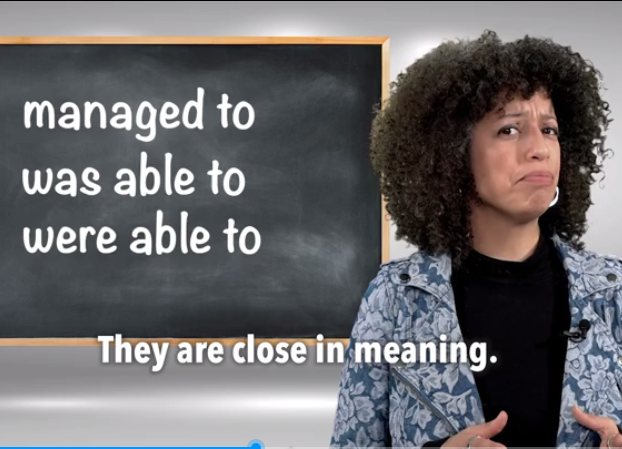This is Everyday Grammar.
这里是《每日语法》节目。
Suppose you were going to give an important speech at an event, but you left your speech notes at home.
假设你要在活动上做一个重要的演讲,但是你把演讲稿忘在家里了。
So, you had to rush around, but you still arrived at the event early.
所以,你不得不匆忙赶路,但你还是提前到达了活动现场。
You could tell this story later.
之后你可以这么讲这个故事。
Today, I had to rush back home for my speech notes.
今天,我不得不赶回家那我的演讲稿。
But I still managed to get to the event early!
但我还是提前到了现场!
"Managed to" is one of two phrases we use to talk about a possibility we had on a specific occasion.
“Managed to”是我们在谈论在某个特定场合发生的可能性时使用的两个短语之一。
The other phrase is "was (or) were able to".
另一个短语是“was/were able to”。
They are close in meaning.
它们的意思很相近。

Listen to an example.
听一个例子。
Then I'll tell you about their similarities and their differences.
然后我会告诉你们它们之间的相似之处和不同点。
The class was expensive. But we were able to get a really good price.
这门课很贵。但我们得到了一个非常好的优惠价。
The class was expensive. But we managed to get a really good price.
这门课很贵。但我们设法得到了一个非常好的优惠价。
"Was (or) were able to" and "managed to" both mean someone succeeded in doing something that was a challenge or that took a special effort.
“was/were able to”和“managed to”都表示某人成功地完成了一件具有挑战或需要付出特别努力的事情。
However, the phrase "managed to" puts a little more emphasis on the challenge or how much effort it took.
然而,“managed to”这个短语更强调挑战性或付出的努力。
English speakers sometimes make the mistake of using "could" to express past abilities on specific occasions.
说英语的人有时会错误地在特定场合使用could来表达过去的能力。
We do not use "could" except in some types of statements.
除了在某些类型的陈述句中,我们不使用could。
We'll talk about that in a future program.
我们将在以后的节目中讨论这个问题。
And that's Everyday Grammar.
以上就是今天的《每日语法》。












